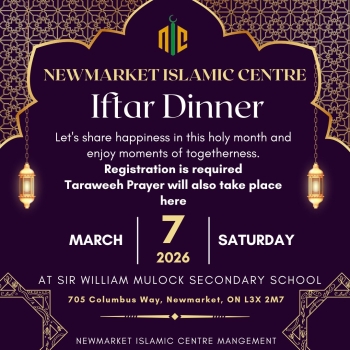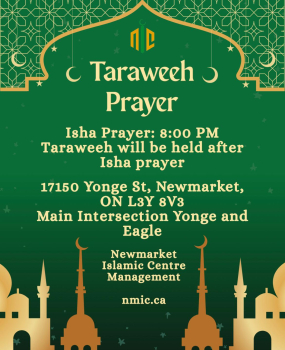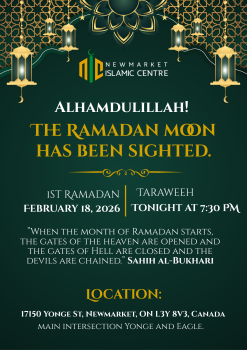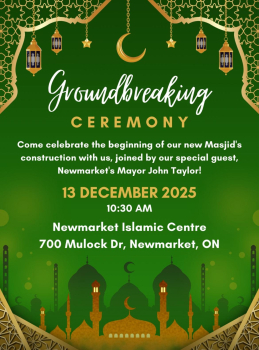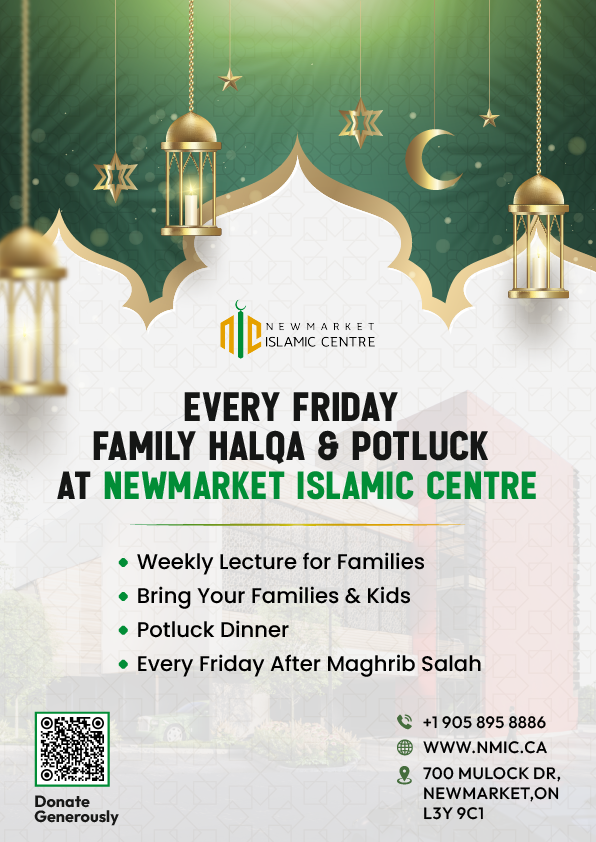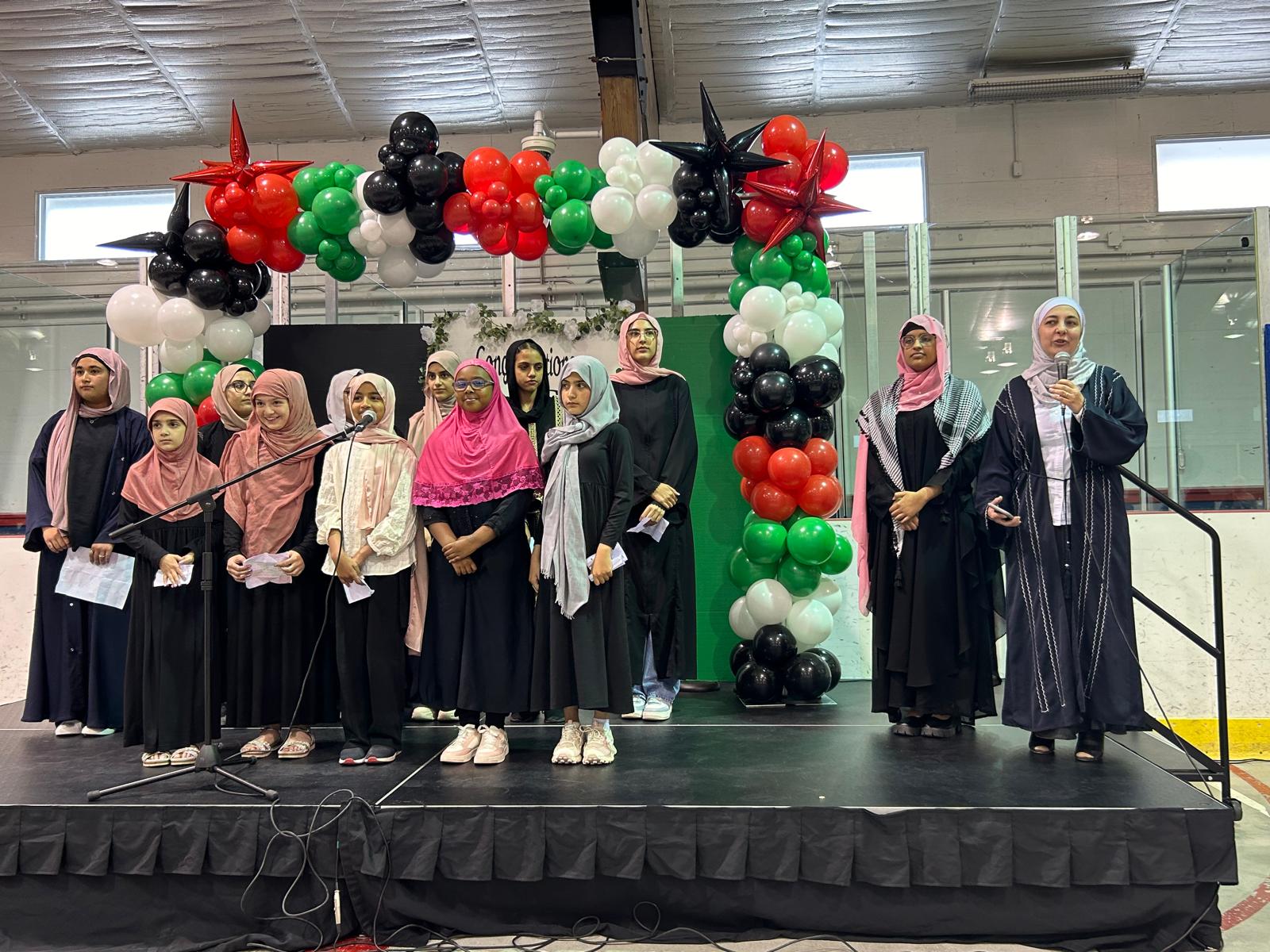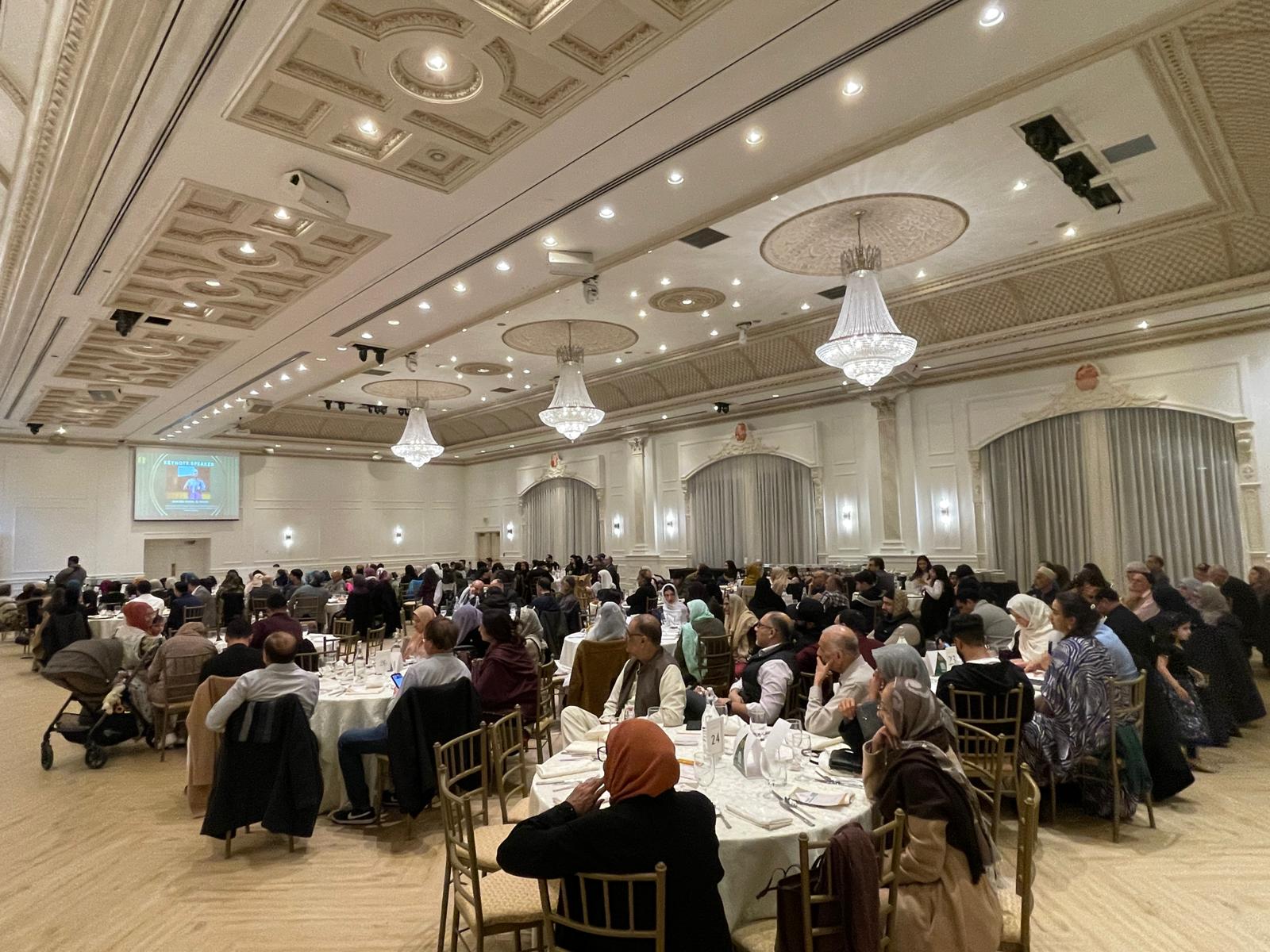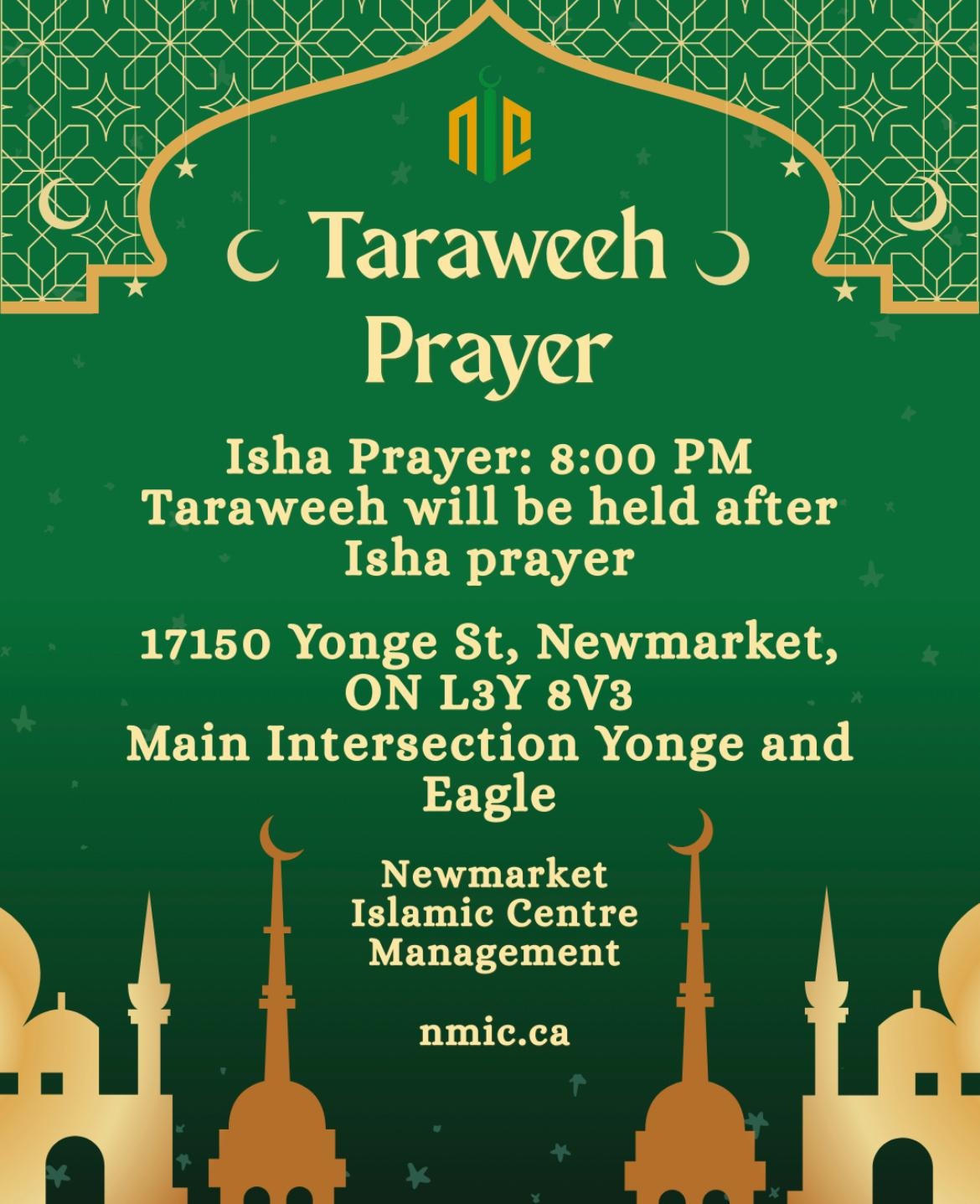Welcome To Newmarket Islamic Centre
Newmarket Islamic Centre is a non-profit religious organization established with the vision of connecting Muslims in both Newmarket and surrounding cities. We first opened our doors in 2005, and have been dedicated to fostering a vibrant Islamic community ever since
Scan or Upload this QR code to join whatsapp group
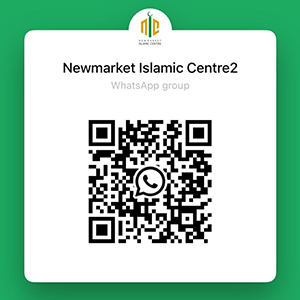
Prayer Times
Newmarket Islamic Centre Prayers timing from February 25 to 28, 2026 ( Wednesday)
Fajar
Dhuhr
Asr
Maghrib
Isha'a
6:00 AM
1:30 PM
4:45 PM
Sunset
7:45 PM
Jummah Prayer
Lead by Qari Huzaifah
Khutba
Friday Prayer
1:00 PM
1:00 PM to 1:30 PM
Prayer 1
Khutbah
Prayer
1:15 PM
1:45 PM
Prayer 2
Khutba
Prayer
2:00 PM
2:30 PM
Jummah Prayer will be held at
Ray Twinney Recreation Complex Hall 2 100 Eagle Street West Newmarket, ON L3Y 1J4
Location: Newmarket Community Centre and Lions Hall 200 Doug Duncan Drive
Newmarket On L3Y 3Y9
*PLEASE NOTE THERE WILL BE ONLY ONE PRAYER*
Announcements
- Eid Salah will be held at Magna Centre in the Hockey Arena, 800 Mulock Dr, Newmarket ON L3Y 9C1
Eid Salah Timings
Sunday June 16, 2024
TAKBEERAT : 8:30 AM
SALAH : 9:00 AM
Jummah prayer will be held at our masjid — the Newmarket Islamic Centre.
700 Mulock Dr, Newmarket, ON L3Y 9C1
-Eid salat will be held at Ray Twinney Recreation Complex’s hockey arena pad #1 100 Eagle St W. Newmaerket ON L3Y1J4
- Friday prayers will be held at Newmarket Soccer Club, 621 Newpark Blvd, Newmarket, ON L3X 2S2, 905-836-8761ext 202

Support us with NIC rebuild project
Construction - Phase 1
NIC Financials
Support us with NIC rebuild
project
Construction - Phase 1
NIC Financials
Prayer Times
Newmarket Islamic Centre Prayers timing from February 25 to 28 , 2026 ( Wednesday)
Fajar
Dhuhr
Asr
Maghrib
Isha'a
6:00 AM
1:30 PM
4:45 PM
Sunset
7:45 PM
Jummah Prayer
Khutba
Friday Prayer
1:00 PM
1:00 PM to 1:30 PM
Prayer 1
Khutba
Prayer
1:15 PM
1:45 PM
Prayer 2
Khutba
Prayer
2:00 PM
2:30PM
Jummah Prayer will be held at
Ray Twinney Recreation Complex Hall 2 100 Eagele Street West Newmarket, ON L3Y 1J4
Location: Ray Twinney Complex Lounge # 2 100 Eagle Street Newmarket NIC Management
*PLEASE NOTE THERE WILL BE ONLY ONE PRAYER*
Announcements
- Eid ul Adha Salah will be held at Magna Centre in the Hockey Arena, 800 Mulock Dr, Newmarket L3Y 9C1
Eid Salah Timings
Sunday June 16, 2024
TAKBEERAT : 8:30 AM
SALAH : 9:00 AM
Jummah prayer will be held at our masjid — the Newmarket Islamic Centre.
700 Mulock Dr, Newmarket, ON L3Y 9C1
- Friday prayers will be held at Lions Hall Community Centre, 200 Doug Duncan Dr, Newmarket, ON L3Y3Y9
– Eid salat will be held at Ray Twinney Recreation Complex’s hockey arena pad #1 100 Eagle St W. Newmaerket ON L3Y1J4
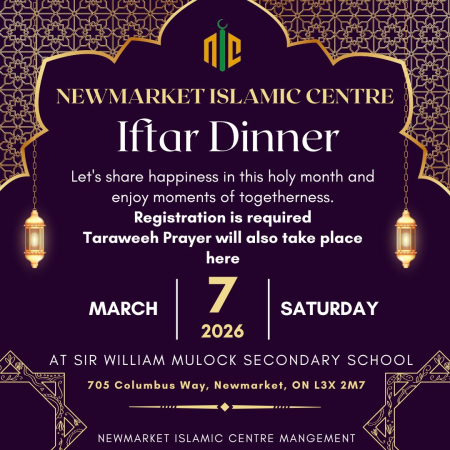
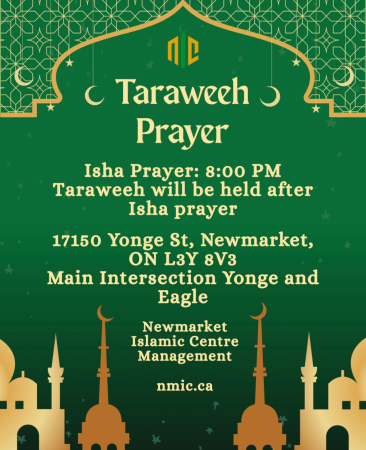


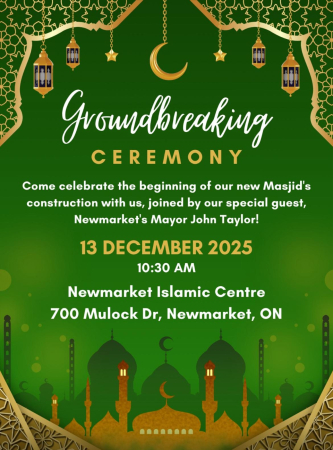
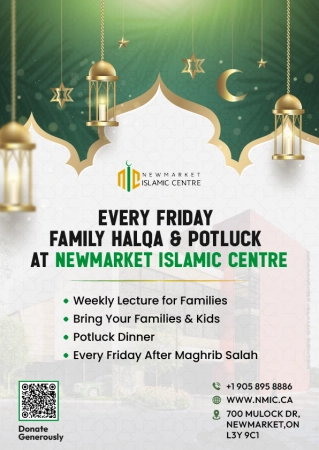
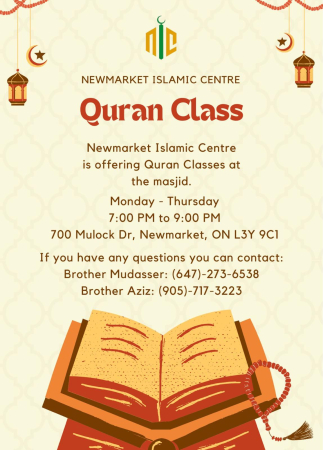

News & Events
OUR GROUND BREAKING CEREMONY
The NewMarket Islamic Centre reached a milestone
Read MoreIslamic School Graduation
The NewMarket Islamic Centre was filled with joy, pride, and...
Read MoreFund Raiser Event
Our community came together for a memorable Fund Raiser Event,...
Read MoreWatch Our story
Newmarket Islamic Centre is a non-profit religious organization established with the vision of connecting Muslims in both Newmarket and surrounding cities. We first opened our doors in 2005, and have been dedicated to fostering a vibrant Islamic community ever since
Five Pillars of Islam
Abstain from dawn to dusk, purify soul to strengthen self-discipline in the month of Ramadan
Services
Build the House of Allah
What you’re seeing isn’t just a building, it’s a future masjid, a madrassah, and a place where hearts will reconnect with Allah. This centre will echo with salah, Quran, and the voices of children learning their deen. Every contribution, no matter the size, helps turn this vision into a living reality. Give today and be part of something that continues to reward you long after.
Islamic School
At the Newmarket Islamic Centre, we are committed to providing comprehensive and holistic Islamic education to youth aged -. This includes both reading and memorizing the Quran, studying Islamic practices/responsibilities and exploring Islamic history and culture. To enroll your child or children into our program, please fill out the following form to register, and we will get back to you as soon as possible to help guide them on their educational journey.
School Calendar
First day
Late registration
Last day
Fall Semester
9.3.2021
9.10.2021
12.7.2021
Spring Semester
1.7.2022
1.14.2022
4.28.2022
Our Recent News
Over 1,200 men and women attend the weekly Jumma prayer service.
60 percent of our community is under the age of 34.
LATEST News
No posts found!

